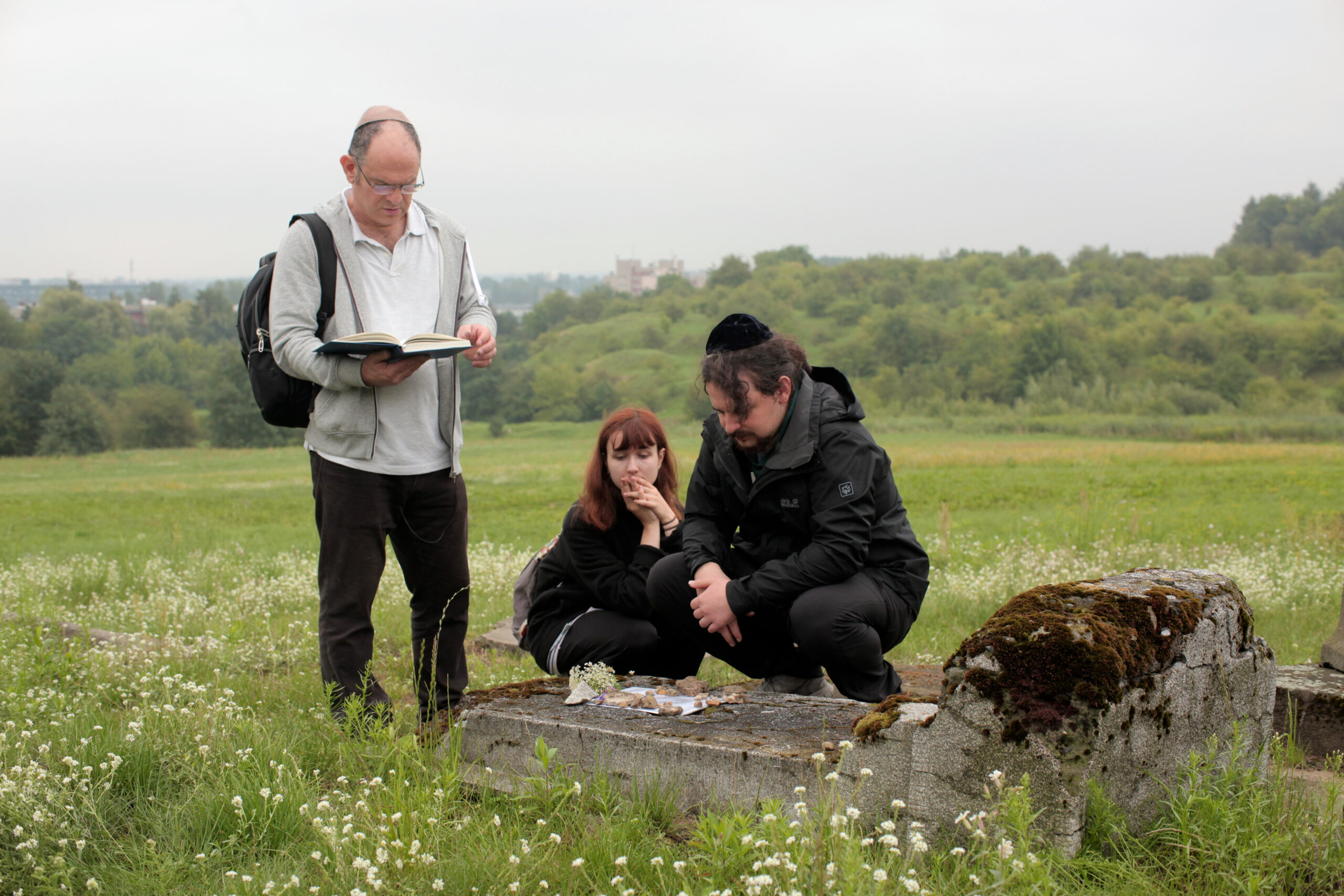Film Review by Professor Robert Abrams, Weill Cornell Medicine, New York
Review of ‘Tacheles—The Heart of the Matter’, directed by Jana Matthes and Andrea Schramm (Germany, 2020), screened at the London Human Rights Watch Film Festival.
In ‘Tacheles—The Heart of the Matter’, Yaar Harell, the real-life twenty-something grandson of Holocaust survivors, is troubled by the fact that he, in the third generation, is still the embodiment of the passivity, sadness and expectation of doom that he associates with being Jewish. To Yaar, Judaism itself has become an illness, a mental condition redolent of suffering. His father (Elieser Zavadsky), representing the family’s second generation of Holocaust survivors, tells him that “my parents lived in mourning,” a state of unrelenting, but unspoken and unexplained sorrow. Yaar’s father endured a joyless childhood with no toys, no birthday celebrations, just silence all around. As a parent himself, he could not feel pride in his children’s move to other cities to advance their lives and careers, because in the concentration camp experiences of his own parents, separation from children spelled death. This is the negative Jewish worldview that Yaar has inherited and seeks to annul. Until nearly its conclusion, viewers of this provocative, arresting film wonder: Will Yaar succeed in upending these assumptions, breaking the psychological cycle of victimization? What will he discover along the way?
To this end, Yaar and his fellow video game-designer Marcel Nist, a German Gentile, decide to team up to create an interactive paradigm in which the Holocaust would be re-enacted, but this time with a difference. They would include elements of hope, or at least ambiguity, to disrupt the legacy of misery passed down from two post-Holocaust generations. In their revisionist scheme, Yaar’s friend Marcel might at times be called upon to enact the role of “good Nazi,” or have altruistic intentions, or perhaps not be a Nazi at all, but an educated upper-class German who had been tricked or compelled to join the SS (Schutzstaffel, or Protection Squads). Marcel’s role might then be scripted to save Yaar’s father’s uncle, Roman, who was killed as a young boy by the Nazis. The young designers banter excitedly as they consider the possibilities. Together with his girlfriend and Marcel, Yaar travels from their home in Germany to Krakow, Poland to stay in the house where his paternal grandparents had once lived, to imbibe the atmosphere and try out different plot scenarios to incorporate as options in their game. Their overriding aim is to avoid a reflex demonization of Nazis. They are determined not to replicate what they refer to as a “Schindler’s List” phenomenon in which Nazi evil is unquestioned and unidimensional.
The action then shifts to Israel, where Yaar has gone to visit his widowed paternal grandmother, Rina Kardisch-Zavadsky, hoping to learn the truth of her life and understand the depression that has come down to him through his father. With great reluctance she haltingly tells Yaar that her happy early childhood in Krakow with philanthropic, loving, well-to do Jewish parents in a pleasant suburb, abruptly ended with the German occupation of Poland. Together with her parents, Rina, and her younger brother Roman, then about age 5, were forced into a ghetto and eventually transported to a concentration camp.*

When Yaar’s father joins him in Krakow, he brings him to meet descendants of the heroic Poles who sought, unsuccessfully, to shelter his mother and young Roman. More of the story emerges, and it becomes clear that Rina’s reticence had everything to do with the fact that she had fled from the approaching Gestapo and had been hiding in a church when her little brother was taken. The guilt and shame she suffered for not being with Roman, abandoning him to die alone, was the principal cause of her silence and forever marred not only her own life but that of Elieser, her only son and Yaar’s father. As a result, Elieser could never be only himself, a son—he had also to stand in for the brother his mother believed she had allowed to die, to be a permanent vessel of her melancholia and remorse.
The essence of trauma-related guilt is the belief that one could have, or ought to have, behaved differently at the time the trauma occurred, and that such behaviour would have prevented or mitigated the disastrous outcome of the event. These are the ungrounded but fixed beliefs that are the source of the worst post-traumatic suffering.
Toward the conclusion of the film, Yaar at last begins to appreciate the staggering power of traumatic guilt and the potential for its intergenerational transmission that had shaped his Jewish identity. Armed with this insight, he and the film’s viewers see how wishful revision of the past may serve to dilute its pain, but only transiently, superficially and at a cost too great to bear: It would create an impossible path to healing. Designing a video game to accommodate the oxymoron of well-meaning, “nice” Nazis would be trivializing and avoidant; in the end it might produce a level of harm as damaging as the suffering his grandmother had transferred down to his father and his father to him. Games and soothing euphemisms like “God has fallen asleep,” actually one of the film’s several subtitles, skirt “the heart of the matter” and fail to offer the desired relief. There may in fact be no remedy at all for losses of this magnitude. But the core message of the film comes through with clarity and emotion: For crimes against humanity to be meaningfully confronted, there must be “tacheles”—the Yiddish word for straight talk–not games in which cruelty is obscured by equivocation or a menu of options in an interactive video. Evil must first be called by its name.
*To explore the concept of traumatic guilt in a Holocaust context, please check the recording of one of the USC Shoa Foundation testimonies of survivors, see Elisabeth Mann approx. at minute 40.0–45.2.